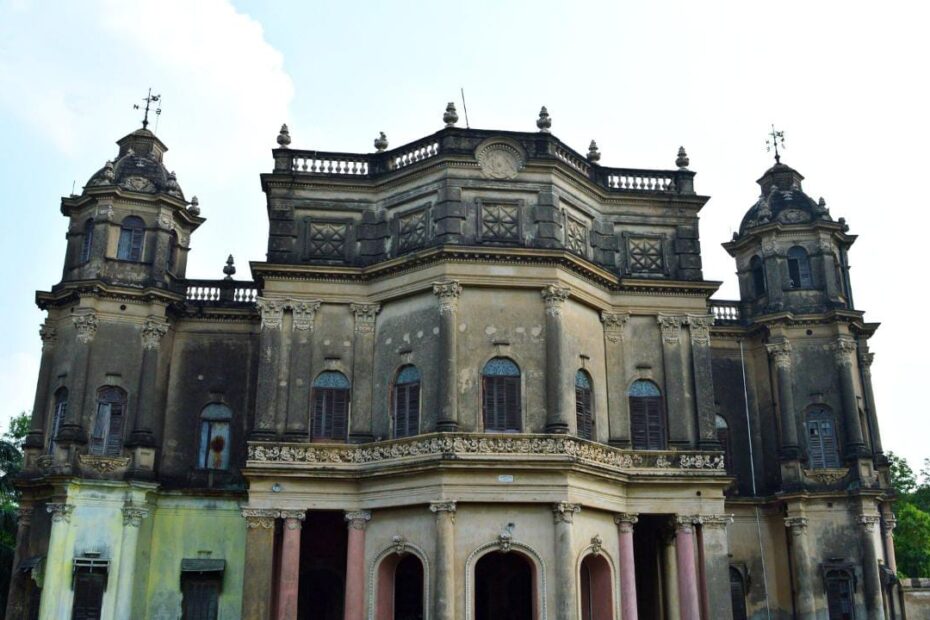The Kashipur Rajbari (Palace) is a well-known heritage monument in Purulia located seven kilometers from Adra and about 25 kilometers from Purulia station.
Over a span of more than 800 years, the Panchakot Royal dynasty resided in Kashipur.
ADVERTISEMENT
The grand palace has numerous ancient antiquities as well as a unique ancient Durga temple.
In this article, you will get to know the following points about the Kashipur Rajbari in Purulia,
Let’s see each of these points in detail…
How to reach Kashipur Rajbari
From Howrah station, you can take a train and get down at either Adra Junction or Purulia Junction.
Trains are also accessible from Asansol, Bokaro, and Jamshedpur.
Alternatively, you can board a bus in Dharmatala and get down at the Purulia bus stop.
The distance between Kolkata and Purulia is approximately 330 kilometers.
From there you can book a Toto or Auto to reach the Rajbari. You can also take a local bus to reach here.
History of Kashipur Rajbari
Maharaja Neelmoni Singh Deo was the initial ruler over Kashipur. He fought with the Britishers to free Panchkot from their clutches.
He was afterward detained and taken to Alipore Central Jail in Calcutta.
His grandson, Maharaja Jyoti Prasad Singdeo, the 67th King of the Panchakot dynasty, rebuilt the enormous palace he had erected.
ADVERTISEMENT
The palace was constructed in 1916 in Kashipur, the state capital of Panchakot in former Purulia.
The Nawab of Murshidabad, Wasif Ali Mirza, gave him immense recognition in 1921.
Also, the British government gave him the title of “Raja Bahadur of Kashipore,” which was the capital of “Panchokot at that time”.
Maharaja Bhuvaneswari Prasad Singhdeo was the final king of the royal family of Singh Deo. The dynasty’s heir continues to reside at this palace.
Occasions at Kashipur Rajbari
King Jyotiprasad Singhdeo invited musicians and intellectuals to his court.
There was a renowned Sanskrit teaching institution in this area called Veda Vidyalaya.
The first book on Jhumur, “Brihat Jhumur Rasamanjari,” was released here by renowned Jhumur poet Bhabapritananda Ojha who was a famous court poet of Kashipur.
Michael Madhusudan Dutt also had a brief collaboration with Kashipur Raj in 1872.
Jhumur, Bhadu, and Bishnupur-style high-pitched melodious music floated from the court. The Darbar hall was filled with the sweet melody of mridangam and flute.
The ‘Navaratna’ meeting was held in the royal court with scholars.
ADVERTISEMENT
Special occasions at Kashipur Rajbari
Durga Puja, Ras Utsav, and Dol are celebrated with great pomp and shows.
Jyotiprasad founded Swaraswat Samaj and this Saraswat society is the center of art practices including yatra drama, pala song, and music.
Facts about the Kashipur Rajbari
King Jyotiprasad Singhdeo commissioned the construction of this palace, which cost Rs. 32,000,000, and employed American craftsmen for the construction of the Royal designs.
Masons from China were brought to implement some of the stunning architecture in this palace.
The construction of this palace continued for 12 consecutive years.
Singhdeo also brought a huge chandelier from Belgium and installed it in the palace’s court hall.
During this period from 1914-1932, Kashipur has undergone great changes.
Philanthropist Jyotiprasad set up an English school and a charitable hospital in Kashipur.
His contribution to the establishment and development of Purulia Lady Dufferin Hospital, District Sadar Hospital, Kusht Ashram, Veterinary Hospital, etc. is undeniable.
Jyotiprasad gained more fame and recognition when coal was later mined from the underground areas in the Dhanbad-Asansol area under his kingdom.
ADVERTISEMENT
Jyotiprasad made arrangements by generating hydroelectricity from the water of the huge Jamadar Dam.
A Pipe water system was also constructed here for the welfare of the people on the Beko River between Kazipur and Waj.
He also built the temple of Kula Dev of the Panchkot dynasty at Kashipur.
Special exhibits at Kashipur Rajbari
Belgian painted glass, large chandeliers, and stone statues show the taste of royalty of the ruler.
There are also weapons exhibited there that were used by kings. Swords and spears are some of them.
However, common people are not allowed to enter the royal palace. A part of the palace is opened to the public only during Durga Puja.
Today, the descendants of the royal family live in this house.
The history of Purulia is incomplete without the opulent palace and the rich history of Kashipur.
Purulia is blessed with beautiful sceneries and historical landmarks that stand significant today in the art, architecture, and history of Bengal.
So make sure to add Kashipur Rajbari to your list of places to visit in Purulia.
Some web stories to know more about West Bengal:
Some other articles you might like
- Neora Jungle Camp (Lataguri) – How To Book, Accommodations
- Jayanti (Dooars) West Bengal – Attractions, Best Time To Visit
- Abanindranath Tagore’s Garden House | Konnagar Bagan Bari
- 8 Best Places For A One Day Tour From Kolkata 2024
- Chandannagar Museum (Hooghly) – Timings, Ticket Price, History
- 4 Best Places To Visit In Bolpur-Shantiniketan (West Bengal)
Disclaimer: Some of the links provided in the article may contain affiliate links. This means when you book or buy something using these links, you help support the website at no extra cost.
